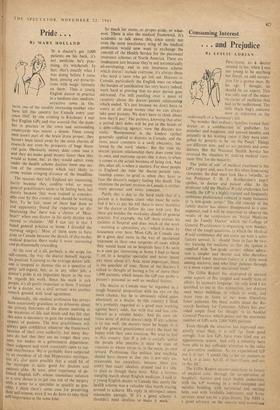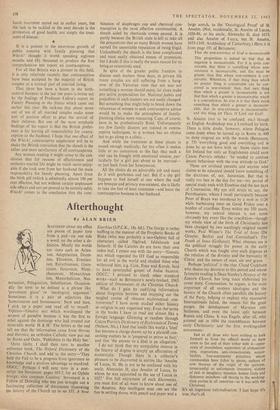Consuming Interest
. . . and Prejudice
By LESLIE ADRIAN
No wonder that .ordinary families treated their doctor as a combination of godfather, lay preacher and magician, and queued humbly and patiently in his waiting room if they were com- pelled by poverty to be 'on the Panel.' Things are different now, and so are patients and some doctors. But the National Health Service has reversed the situation by making medical treat- ment 'free' for the majority.
The 'point of sale' of medical treatment is the GP's surgery and, seen from this often frustrating viewpoint, the deal must look like a 'swindle,' to use Professor J. H. F. Brotherston's angry epithet, to doctor and patient alike. As the professor told the Medico! World conference last month, the GP is a highly-trained and frequently ambitious professional reduced in many instances to 'a low-grade sorter.' The old concept of the family doctor has almost disappeared as a con- sequence, and it will be important to observe the results of the symposium on 'Social Medicine and the Family Doctor' which the College of General Practitioners is organising next Sunday. One of the tough questions. to which the Medical World conference did not come up with a satis- factory answer, is: should there in fact be two- tier training for medicos. so that the system is supplied with 'low-grade sorters' whose educa- tion is simpler and shorter and who therefore command lower incomes (salary is a dirty word among doctors), and who filter patients through to a more expert and specialised team'?
The Gillie Report has attempted to unravel some aspects of this tangled and woolly state of affairs. In layman's language. the only kind I am qualified to use in this connection, our doctors need better buildings in which to work, and more time to listen to our woes (therefore fewer patients). On these points alone the Re- search Institute for Consumer ,Affairs has pro- vided ample food. for thought in its booklet General Practice, which points out the enormous number of GPs with 3,000 NHS patients.
Even though the situation has improved mar- ginally since then, it is still far frog good enough. Too few GI's have even tried out an appointment system. And only a minority have been able to pay sufficient attention to the value of preventive medicine. As an experienced GP put it to me: 'I would like to see my patients in Act I, or at least Act II. of their illness, and not in Act III.' • • The 011ie Report recommendations in favour of medical care, through the co-operation of hospitals. doctors and local health authorities, with the GP working in a well-equipped and suitable building, with secretarial and nursing help, and with available laboratory and X-ray services, need not he a pipe dream. The NHS is a great advance on the uneven and sometimes
harsh treatment meted out in earlier years, but the task to be tackled in the next decade is the promotion of good health, not simply the treat- ment of disease.
It is a pointer to the enormous growth of public concern with family planning that Which? thought it worth spending eighteen months and f8-f thousand to produce the first comprehensive test report on contraceptives.
For all that Britain was a pioneer in this field, it is only relatively recently that contraceptives have been accepted by the majority of British couples as a normal part of married living.
That there has been a boom in the birth- control business in the last ten years is borne out by the findings of Professor Lafitte's report on Family Planning in the Sixties which came out earlier this year. He reckons that about seven out of ten of all married couples make some sort of positive effort to plan the arrival of their children. But one of the most emphatic findings of his report is that the British prefer- ence is for leaving all responsibility for contra- ception to the husband. I hope that one effect of the Which?,contraceptive supplement will be to shake the British conviction that the sheath is the safest and most satisfactory of all contraceptives.
Any woman reading it might come to the con- clusion that for reasons of effectiveness and esthetics marital life might be much more enjoy- able if she took over from her husband the main responsibility for family planning. Apart from the birth pill (which is admittedly almost 100 per cent effective, but not without certain unpleasant side effects and not yet proved to be entirely safe), Which? comes to the conclusion that the corn- orn-
bination of diaphragm cap and chemical con- traceptive is the most effective combination. A sheath aided by chemicals comes second. It is partly because the British male is left to take all the precautions that so many British women have earned the unenviable reputation of being frigid. Undoubtedly the sheath is the least complicated and most easily obtained means of protection, but I doubt if this is really the main reason for its being so extensively used.
In spite of the greater public freedom to discuss such matters these days, in private life many couples are still suffering from a hang- over of the Victorian view that sex was not something a woman should enjoy, let alone make any active preparations for. National habits and prejudices in such matters are not easily changed. But something that might help to break down the reluctance of women to seek contraceptive advice would be to make the atmosphere of family- planning clinics more reassuring. Caps, of course, have to be professionally fitted. Unfortunately too few family doctors are trained in contra- ceptive techniques, so a woman has no choice but to go along to a clinic.. • And while the treatment at these places is sound enough medically, far too often it makes little or no concession to the fact that such a visit can be fraught with emotional tension, par- ticularly for a girl just about to be Married— or just back from her honeymoon.
All the clinics do an admirable job and many do it with gentleness and tact. But if a shy girl happens to find herself at one where the staff are brusque and privacy non-existent, she is likely to take the line of least resistance—and leave the contraceptive business to her husband.



































 Previous page
Previous page